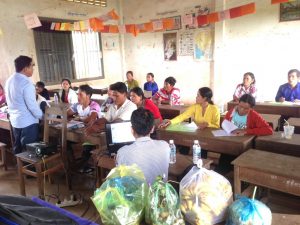Evaluation
In February-March 2019, the project commissioned an independent evaluation to assess the relevance, effectiveness, efficiency, impact, and sustainability of Morodok’s program over the last few years. The evaluation found that the “Morodok project is highly relevant to, and appreciated by, the target communities. The program has made a significant contribution to the goal of improved livelihoods.” The evaluation provided suggestions for improvement, which staff have incorporated into an evaluation implementation plan and future activities. Morodok’s intervention is still a work in progress, and the evaluation recommended “future phases should keep same focus.”
Community Based Development Project
This small 15-month project, which ended in March 2018, was funded by the Australian Embassy’s Direct Aid Program (DAP) with the aim of strengthening a component of Morodok’s much larger Community Livelihoods Project.
The project aimed that “By the end of the project at least 30 community entrepreneur groups (at least 60% of which are women) in 5 target communes around Kompong Som Bay utilize community-owned financial services and improved production techniques to customize market oriented products that enhance their business opportunities.” The 5 target communes are: Chikhor Leu, Ou Treh, Kampong Seila, Kandaol, and Tropeang Rung.
Through this project, Morodok assisted and supported 105 of the poorest families (including 88 female heads of household) to organize 29 producer interest groups to implement small business projects in the target areas. Approximately 500 family members, including women and children, benefited from these income generation projects.
29 producer groups jointly organized commune market networks in the 5 DAP-supported communes, and initiated community trade plans through collective buying of products in each commune. The project also provided ongoing technical and administrative support to 5 Community Revolving Fund Management Committees (CRFs) consisting of 20 members (of which 15 are women), through building their capacity to manage their revolving capital to support 105 families running income generation projects.

